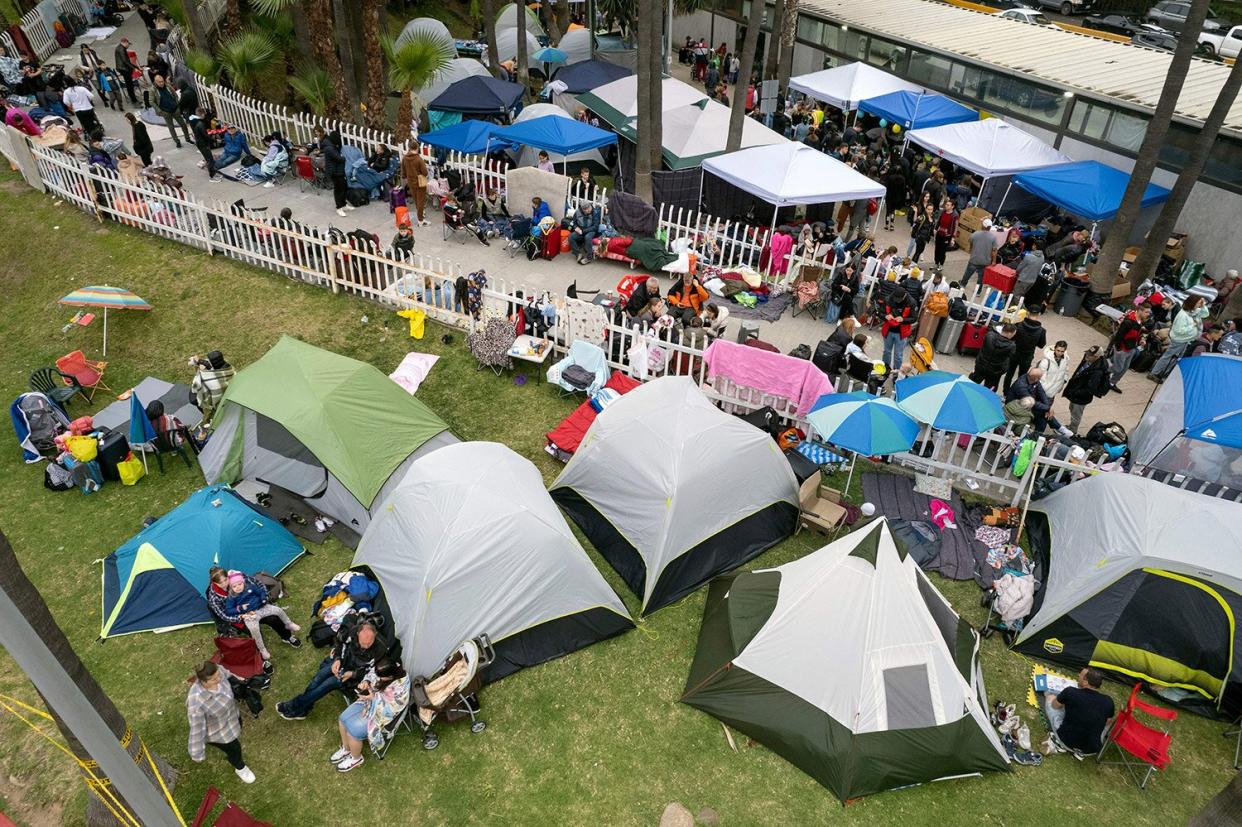Why Ukrainian Kids are Being Temporarily Kept from Their Families at the Southern Border

GUILLERMO ARIAS/AFP Ukrainian refugees in Mexico at the border
Some of the youngest refugees of the Russian invasion of Ukraine are reportedly finding themselves temporarily isolated from relatives after crossing the U.S.-Mexico border — the result of a law requiring unaccompanied minors be placed in government shelters until their guardians have been approved.
According to a New York Times story published Tuesday, the rule (which stems from a law that went into effect in 2008) is impacting many of the thousands of Ukrainians now waiting at the border for permission to enter the U.S.
The Times cites one example in which a woman drove from Los Angeles to pick up her 14-year-old nephew who had fled Ukraine and flown to Mexico. Despite bringing a notarized power of attorney attesting that the boy had been handed into her care, authorities told the woman he could not yet enter the U.S. and that the two would have to wait "one or two days."
It would be 10 days before the woman finally learned where her nephew was, the Times reported.
In another incident, a 17-year-old girl who crossed the border into Poland and then flew to Mexico with an adult family friend — with a notarized letter written by her parents in hand — was subsequently separated from the chaperone at the U.S. border.
The Times reported that, after officers confiscated the teenager's phone, baggage and shoelaces, she shared a cell with "25 women and children from Ukraine, Russia and other countries, all trying to sleep on the floor with only flimsy foil blankets to cover them."
The girl was transferred to a migrant children's shelter in the Bronx and eventually received approval to stay with the family friend, then reunited with her some three weeks after she initially made it to the border.
RELATED: Thousands of Germans in Berlin Offer Housing to Ukrainian Refugees amid Russian Invasion
Though the law most often affects Central American kids and is meant to prevent trafficking and ensure their safety, the requirement has become another step for the unique flow of Ukrainian refugees to the southern border, which they view as the most efficient entry into the country.
Many of the Ukrainian families likely weren't even familiar with the law when they sent their children to the Mexico crossing to meet with loved ones to bring them into the U.S.
The Times reports that volunteers working with refugees have estimated that at least 50 children have kept from their families or loved ones as a result of the law. No official figures specifically regarding Ukrainian migrant children have been released by U.S. authorities, but a statement sent by the Department of Health and Services on Tuesday noted that 334 unaccompanied children total had been temporarily detained and placed in U.S. Customs and Border Protection custody in the last 30 days.
The statement said that 358 children were in CBP custody as of Monday.
Most of the children who are arriving in Tijuana, Mexico, from Ukraine are doing so because their parents could not leave with them. (Most Ukrainian men, for instance, have been forced to stay in Ukraine in case they are needed to join the resistance effort.)
According to a statement sent by the Department of Health and Human Services on Tuesday, "An unaccompanied child who is taken into custody by Customs and Border Protection is brought to a facility and processed for transfer to the Department of Health and Human Services (HHS) as required by law."
RELATED: Ukraine's President Zelenskyy Expresses His Anguish Knowing Parents Have Lost Kids in Russia's War
HHS says it holds the child "for testing and quarantine and shelters the child until the child is placed with a sponsor here in the United States."
In "more than 80 percent of cases, the child has a family member in the United States," HHS says, adding that, "These children are reunited with their families who will care for them. The children then go through immigration proceedings where they are able to present an application for asylum or other protection under the law."
The Russian attack on Ukraine is an evolving story, with information changing quickly. Follow PEOPLE's complete coverage of the war here, including stories from citizens on the ground and ways to help.

